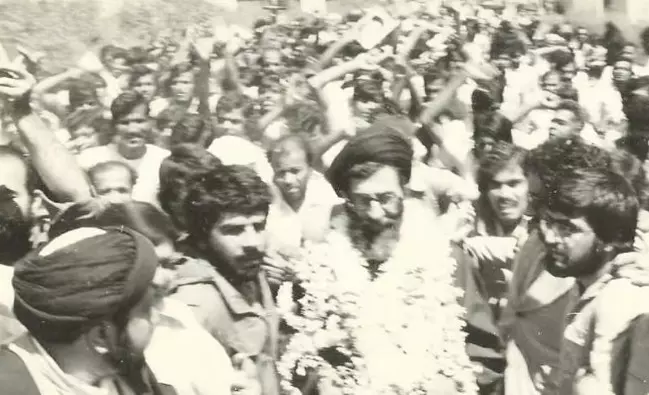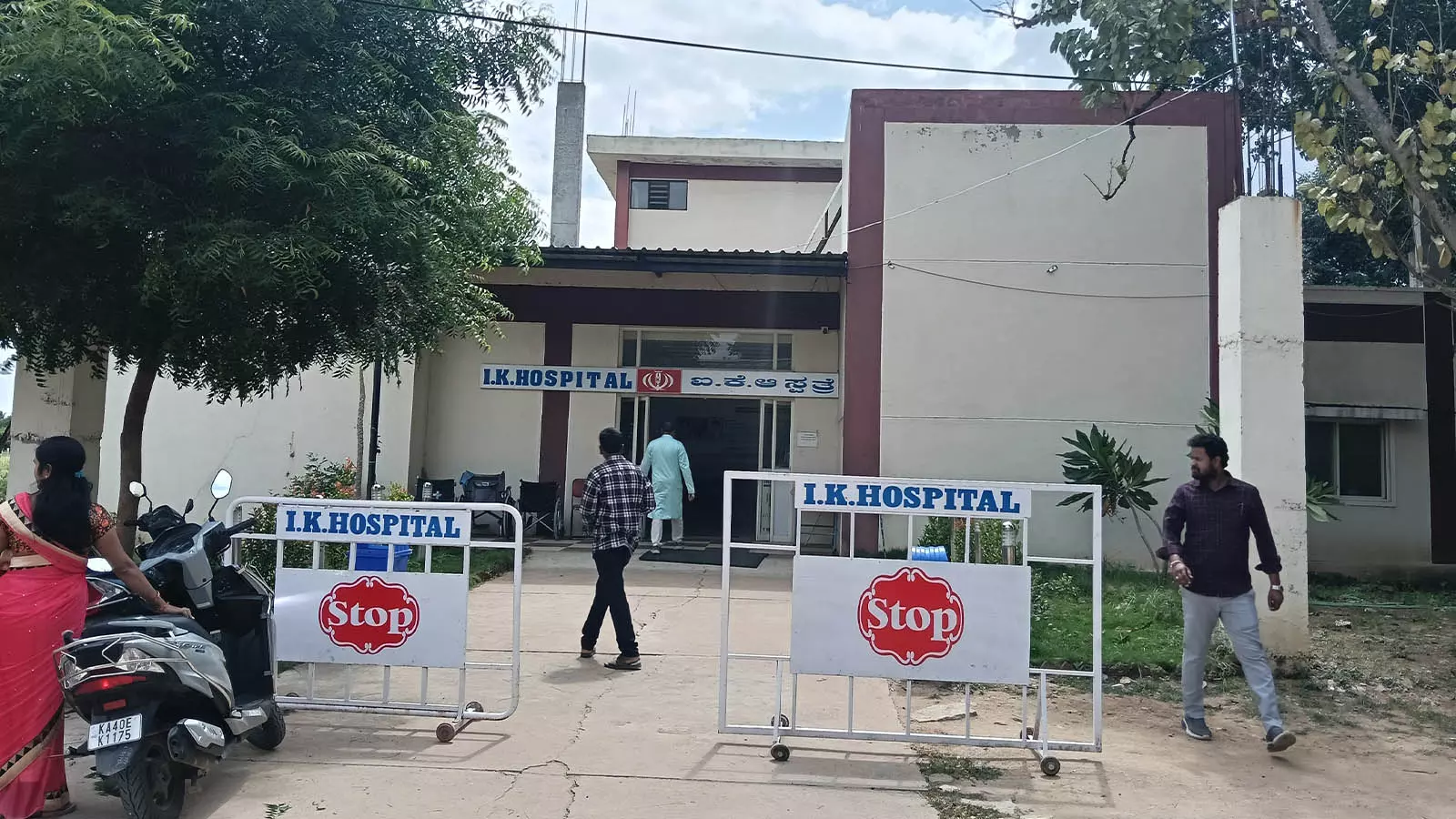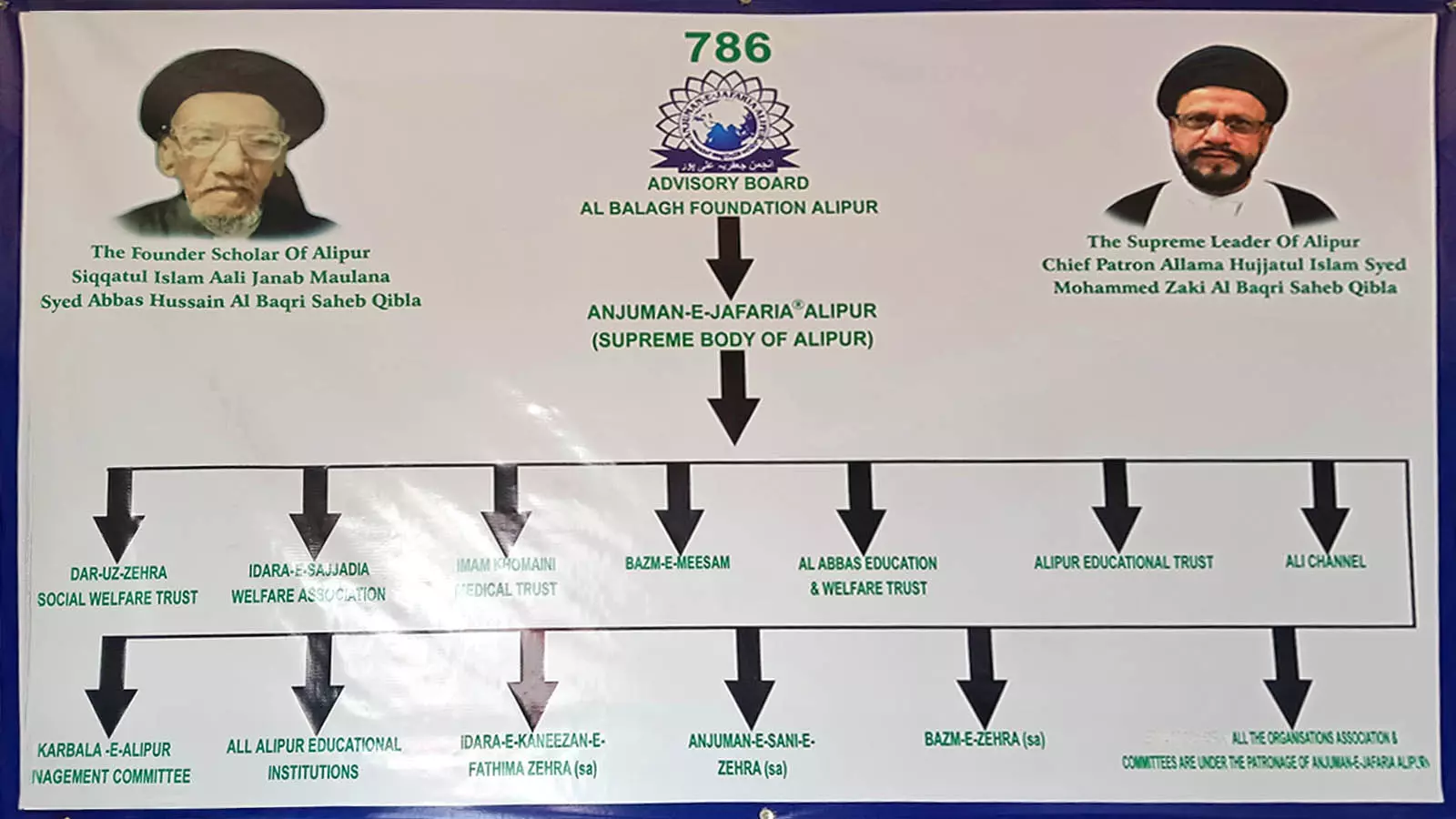
- Home
- India
- World
- Premium
- THE FEDERAL SPECIAL
- Analysis
- States
- Perspective
- Videos
- Sports
- Education
- Entertainment
- Elections
- Features
- Health
- Business
- Series
- In memoriam: Sheikh Mujibur Rahman
- Bishnoi's Men
- NEET TANGLE
- Economy Series
- Earth Day
- Kashmir’s Frozen Turbulence
- India@75
- The legend of Ramjanmabhoomi
- Liberalisation@30
- How to tame a dragon
- Celebrating biodiversity
- Farm Matters
- 50 days of solitude
- Bringing Migrants Home
- Budget 2020
- Jharkhand Votes
- The Federal Investigates
- The Federal Impact
- Vanishing Sand
- Gandhi @ 150
- Andhra Today
- Field report
- Operation Gulmarg
- Pandemic @1 Mn in India
- The Federal Year-End
- The Zero Year
- Science
- Brand studio
- Newsletter
- Elections 2024
- Events
Why this village in Karnataka seeks guidance from Iranian supreme leader Khamenei

It isn’t just Iran which has put everything at stake to defend its supreme leader Ayatollah Ali Khamenei. Just 79 km from Bengaluru, Khamenei’s words are considered final authority by people of Alipur village in Chikkaballapur district.Despite being located in India, all decisions in Alipur, a village which has drawn national attention due to its industries and businesses, are taken on...
It isn’t just Iran which has put everything at stake to defend its supreme leader Ayatollah Ali Khamenei. Just 79 km from Bengaluru, Khamenei’s words are considered final authority by people of Alipur village in Chikkaballapur district.
Despite being located in India, all decisions in Alipur, a village which has drawn national attention due to its industries and businesses, are taken on the advice of Khamenei, the religious leader of Shia Muslims.
“If any major decision needs to be made in the village, it is taken by Anjuman-e-Jafria (supreme council). But before that, every development or movement here is conveyed to the head of the committee, Allama Hujjatul Islam Syed Mohammed Zaki Ali Bakhri Saheb Qibla. He is the conduit between Iran and our village. Allama lives in Canada and informs Khamenei of our decisions. He then conveys Khamenei’s guidance to us. Only after that do we decide on tricky or contentious issues,” says Anjuman-e-Jafria member Mir Shabahath Hussain.
While Shia Muslims across the world hold Khamenei in high esteem as a religious and political leader, the bond that Alipur shares with him deepened in 1986 when Khamenei arrived in the village on a visit. To commemorate Khamenei’s visit, a hospital named after his mentor—Imam Khomeini Hospital—was inauguarted in Alipur in 1991, offering quality treatment at affordable rates. The consultation fee is only ₹50. “Patients from any part of the village can avail auto-rickshaw services at a subsidized rate of ₹20,” said hospital administrator Dr. Nadeem.

Ayatollah Ali Khamenei in Alipur in 1986.
The hospital was inaugurated by former vice president BD Jatti, Governor Khurshid Alam Khan, and then Iranian ambassador to India, Ebrahim Rahimpour.
In June, as Iran came under attack from Israel, The Federal visited Alipur, which is just and 61 km from Kempegowda International Airport, to get a sense of the village was coping.
About 250-300 people from Alipur who live in Tehran and other Iranian cities have been caught in the crossfire. Back home, their kith and kin living Alipur are spending sleepless nights due to the tension. Every time Israel launches fresh attacks on Iran, people in Alipur become extremely worried. Each missile strike raises their anxiety. With news coming in patches, the air in Alipur is laden with fear.
From Ballikunte to Alipur…
During the rule of the Bahmani Sultans—the first independent Muslim rulers in South India—Shia Muslims had settled in Bijapur (present-day Vijayapura). But after the Mughal army, led by Aurangzeb, captured Bijapur, the Sultanate came to an end. After the decline of the Bijapur Sultanate, a prominent medieval kingdom in southwestern India, which ruled from 1490 to 1686, Shia Muslim families migrated to what was then called Ballikunte (now Alipur) as they feared living under Sunni rulers. As marital relations were established within the community, the population began to grow.
Bellikunte gradually developed strong religious and cultural ties with Iran, Syria, Saudi Arabia, and Iraq, which are important pilgrimage sites for Shia Muslims.
At that time, the Shia Muslims renamed the village after their sect’s founder Ali ibn Abi Talib. Ali was the cousin and son-in-law of the Prophet Muhammad, and Shia Muslims believe he was designated as Muhammad's successor.
Most Muslims in Alipur prefer to marry within the village. Nearly 95% of marriages take place within the community, which means almost everyone in the village is related in some way.
Many in Alipur believe the ancestors of Khomeini were of Indian origin.

The Imam Khomeini Hospital
A religious scholar named Syed Ahmad Musavi Hindi, who was born in Kintoor village of Barabanki district in Uttar Pradesh, later migrated to Iran. He played a key role in establishing the Khamenei family within the Shia religious tradition. Iranian records also mention the name of Syed Ahmad Musavi Hindi. Though he settled in Iran, he proudly used the surname ‘Hindi’ to reflect his Indian birthplace, which he referred to as ‘Hindustan’.
Shia families have been living in Alipur for nearly 350 years. Over time, they have established strong business and trade ties with countries in the Middle East, giving the village a unique identity. Currently, Alipur has a population of about 30,000 people of which around 25,000 are Muslims, and 5,000 are Hindus. Among the 4,850 families living here, the Shia community is in majority. Alipur is currently a gram panchayat. The government has now decided to upgrade it to a town panchayat. This is expected to bring more development to the village.
Currently, more than 50 people from the village are working as doctors, engineers, and IT professionals across Bengaluru and beyond. The affiliation to Alipur, however, stands strong. Around 50 people from Alipur have migrated to foreign countries for education and employment. Many of them are settled in countries like England, Canada, the US, Saudi Arabia, Iran, Iraq, Thailand, Indonesia, and Singapore for business purposes. But all them head back home at least once a year.
“All of them return to Alipur every year to celebrate the festivals of Muharram and Ramadan,” Mir Shabahath Hussain, a member of the Anjuman Jafaria Committee, told The Federal.
Even though many businessmen from Alipur have settled abroad, every family is expected to own a house and land in the village.
“No matter where people do business, they eventually return to the village. That is why everyone has built a house and holds land here,” says Mir Shabahath Hussain of the Anjuman Committee.
Traders hub
The village gained wider recognition after former Union Railway Minister RL Jalappa made it his home. Over time, with growth in industries and trade, Alipur transformed into a major commercial hub. Often referred to as the ‘Baby of Iran’, Alipur is home to many entrepreneurs engaged in the gemstones trade.
Businesspeople from Alipur import gemstones from countries like Thailand and Indonesia, then polish and design them into various shapes. These polished stones are used in making gold jewellery.
Traders from Alipur are active in the gems market in Thailand. About 20 years ago, Alipur had its own gemstone polishing units. Traders used to buy stones from Thailand, Indonesia, and Jaipur (Rajasthan), polish them locally, and export the finished products to other countries.
“With advancements in technology, this business has declined. Now, only those who have been in the trade for a long time run it,” said Mir Tasveer Abbas, a resident of Alipur.
There are also reports that some entrepreneurs from Alipur are involved in gold and diamond trading, but local leaders have dismissed these claims.
Anjuman Committee: The Supreme Authority in Alipur
The Anjuman-e-Jafria, with 30 members, is the highest authority in Alipur. It functions under the advisory board of the Al-Balagh Foundation. Under this supreme council, several organisations perform varying functions. In Alipur, any major religious or community decision is finalised by the Anjuman committee, which enjoys a final say in all matters. Even in cases of domestic violence or divorce, people in the village rarely approach the police station or the courts. Most disputes are handled and resolved internally by the committee. When in doubt, the committee refers it to Khamenei.

Alipur’s Supreme Religious Council Anjuman Jafriya and its affiliated institutions.
"If any issue arises in the village, we don’t wait for government grants. The committee itself begins development works," said Mir Abbas Ali, a member of the Anjuman committee, speaking to The Federal Karnataka.
The management committee of Anjuman changes every five years, while the president and secretary change every two years.
The Anjuman committee draws its legitimacy from helping the destitute. In Islam, Zakat is a compulsory form of charity. A portion of one’s wealth must be donated to those in need. Similarly, businessmen from Alipur set aside a part of their income for charitable and religious purposes.
The Anjuman committee ensures that everyone follows this practice strictly. About 50% of families in Alipur are economically poor. The Anjuman Committee provides school supplies, uniforms, and educational support to poor children. They also offer up to 20% discount in school fees for underprivileged students.
“When families are unable to pay fees, they are given partial waivers,” a local resident, Avinash (name changed), told The Federal requesting anonymity.
Buoyoed by this responsive system, Alipur continues to revere Khamenei, and remains tense amid the simmering conflict.
